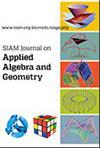周期图上特征值的密度
IF 1.6
2区 数学
Q2 MATHEMATICS, APPLIED
引用次数: 1
摘要
假设$\Gamma=(V,E)$是一个图,它有顶点$V$,边$E$,顶点$\mathbb{Z}^d \curvearrowright V$上有一个有有限多个轨道的自由群作用,希尔伯特空间$l^2(V)$上有一个线性算子$D$,使得$D$与群作用交换。将$\lambda \in \mathbb{R}$固定在$D$的纯点谱中,考虑有限支持$K$的所有特征函数的向量空间。然后$K$是Laurent多项式环上的非平凡有限生成模,并且$\lambda$的密度通过取$K$的有限自由分辨率由欧拉特征型公式给出。此外,在适当的假设下,这些主张推广到一个有限生成的可服从群的非交换设置,该群自由作用于具有有限多个轨道的顶点上,并与算子$D$交换。本文章由计算机程序翻译,如有差异,请以英文原文为准。
On the Density of Eigenvalues on Periodic Graphs
Suppose that $\Gamma=(V,E)$ is a graph with vertices $V$, edges $E$, a free group action on the vertices $\mathbb{Z}^d \curvearrowright V$ with finitely many orbits, and a linear operator $D$ on the Hilbert space $l^2(V)$ such that $D$ commutes with the group action. Fix $\lambda \in \mathbb{R}$ in the pure-point spectrum of $D$ and consider the vector space of all eigenfunctions of finite support $K$. Then $K$ is a non-trivial finitely generated module over the ring of Laurent polynomials, and the density of $\lambda$ is given by an Euler-characteristic type formula by taking a finite free resolution of $K$. Furthermore, these claims generalize under suitable assumptions to the non-commutative setting of a finite generated amenable group acting on the vertices freely with finitely many orbits, and commuting with the operator $D$.
求助全文
通过发布文献求助,成功后即可免费获取论文全文。
去求助
来源期刊

SIAM Journal on Applied Algebra and Geometry
MATHEMATICS, APPLIED-
CiteScore
2.20
自引率
0.00%
发文量
19
 求助内容:
求助内容: 应助结果提醒方式:
应助结果提醒方式:


